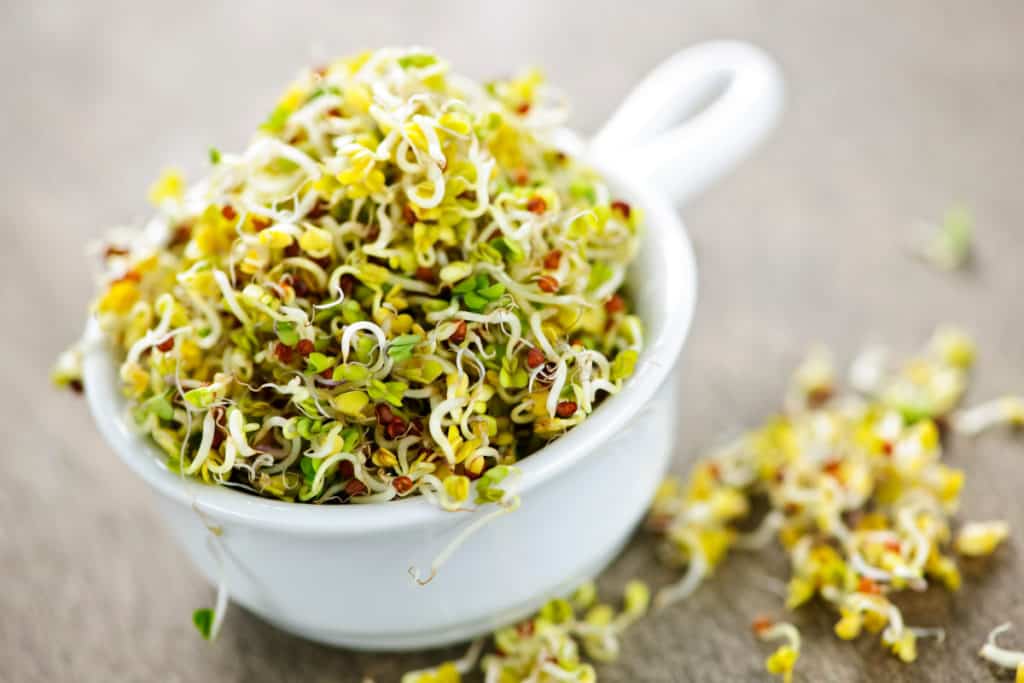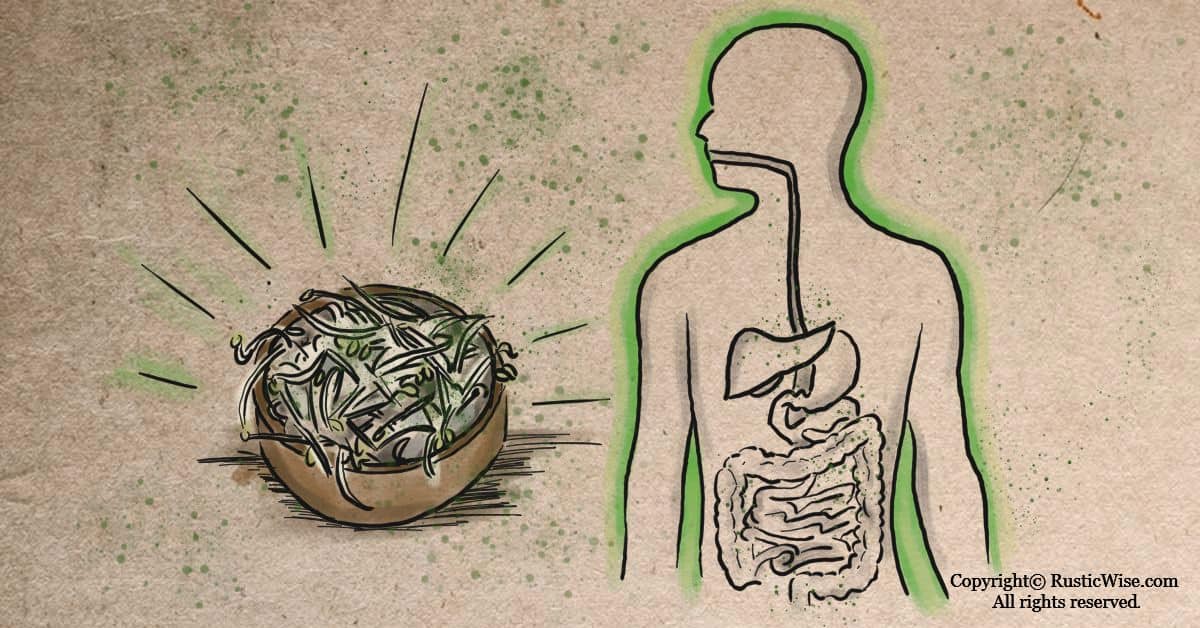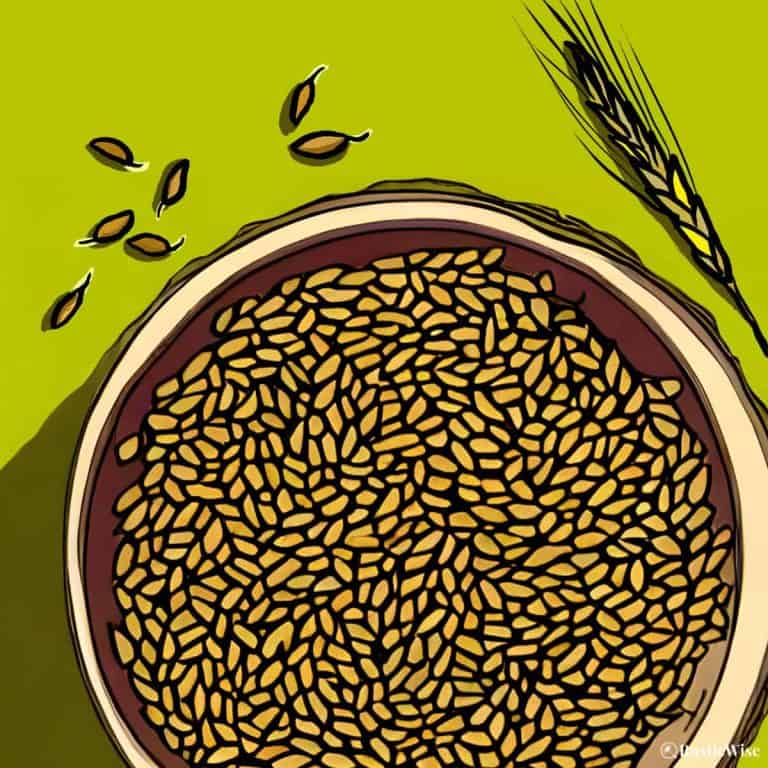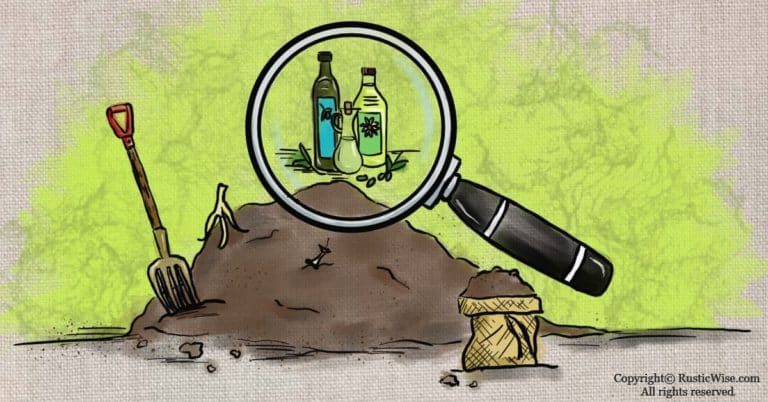Are Sprouts Hard To Digest?
If you have a sensitive stomach, you know that certain foods like legumes, grains, seeds, and nuts are harder to digest. If you’re looking to add sprouts to your diet, you might ask, are sprouts hard to digest? The process of sprouting helps to break down antinutrients making sprouts easier to digest than unsprouted foods. Sprouts are also jam-packed with nutrients.
What exactly are sprouts? Sprouts are seeds that are soaked, germinated, and harvested when only a few days old. They are eaten whole—seed, root, and shoot. While different types of sprouts have different nutritional profiles, most are a rich source of vitamins C and K, and protein.
Adding sprouts to your diet is a great way to add a healthy dose of nutrients and antioxidants. Let’s take a closer look at how sprouts affect digestion.
Medical Definition of antinutrient: a naturally-occurring substance (such as saponin or tannin) found in plant-derived foods that interferes with absorption or proper functioning of nutrients in the body. —Merriam-Webster
A quick look at digestion
First, a quick look at digestion and what makes certain foods harder to digest.
Digestion is the process of breaking down food into energy that’s used to power the body. A few different factors affect digestion (or indigestion) such as the portion size, your health, age, and metabolism.
On one end of the spectrum water and liquids are easiest to digest. On the other end of the spectrum, fatty foods, processed foods, complex carbohydrates, or too much fiber makes digestion difficult.
By now, you’re probably aware that certain types of foods including beans, and vegetables in the Brassica family (Brussels sprouts, cabbage, broccoli, and cauliflower) make some people gassy.
This is because beans and certain types of vegetables contain certain types of sugar and proteins that are hard to digest. Their high fiber-content adds to the difficulty. These types of foods often lead to bloating, cramping, or gassiness.
Tip: While fiber is good for digestion, too much fiber wreaks havoc on your digestive system. When amping up your fiber intake, start slowly.
An overview of sprouts and why they may be easier to digest
So are sprouts hard to digest? First, it’s important to remember there are a number of different types of sprouts, each with their own unique nutritional profiles:
- Bean and pea sprouts: Mung beans, soybean, green pea, garbanzo, and lentil.
- Nuts and seeds: Alfalfa seed, sunflower, sesame, radish and pumpkin.
- Vegetables: Broccoli, mustard greens (which have a spicy flavor), clover, and beets.
- Sprouted grains: Quinoa, amaranth, oat, and buckwheat, and millet.
The sprouting process is helpful in that it helps break down the outer protective layer of seeds which contains complex proteins, antinutrients, enzyme inhibitors and phytic acid.
- Phytic acid: Present in grains, nuts, seeds, and legumes. When you eat these types of foods, the phytates bind with other minerals such as zinc, calcium, and iron and impedes their absorption by the body.
- Enzyme inhibitors: The pancreas uses digestive enzymes to break down food. However, these digestive enzymes can’t do their job properly when you eat foods that naturally hinder their digestion.
- Antinutrients: Plants contain naturally occurring compounds called antinutrients. Antinutrients disrupt the absorption of important minerals and vitamins. Our bodies aren’t equipped to deal with a large dose of antinutrients which leads to digestion problems.
Now here’s where sprouting helps make digestion easier. Studies show that the process of seed germination helps to:
- Reduce the level of antinutrients present.
- Reduce the level of phytates.
- Reduce the amount of gluten in grains. Gluten is a hard-to-digest protein found in many types of wheat.
- Increase the level of insoluble fiber which in turn aids digestion. Insoluble fiber helps to feed the “good” bacteria in your intestines which help to break down food.
- Improve the nutritional content as key minerals such as iron, calcium, and zinc are more easily absorbed.
Even before seeds germinate, they’re rinsed and soaked. These two key steps taken when growing sprouts help to further break down the outer protective layer.
Takeaway: People who experience problems with digesting certain types of vegetables or legumes may have an easier time with the sprouted version of the same plant. So if you find normal broccoli hard to digest, broccoli sprouts might go down easier. If you have digestive issues, please speak with a doctor before adding sprouts to your diet.

Credit: Yay Images
Are sprouted grains easier to digest?
According to Harvard Health, sprouted grains are easier to digest than their unsprouted counterparts. This is due to the germination process we touched on above.
The seed’s endosperm which contains starch breaks down. The starch is what makes grains hard to digest for many people.
When the outer shell breaks down, the level of nutrients, vitamins, and minerals that the body is able to absorb increases. This includes key nutrients such as iron, vitamin C, protein, folate, magnesium, and zinc.
So if you have a hankering for some toast, try a slice of sprouted grain bread.
Do Brussels sprouts cause gas?
In a nutshell, yes, Brussels sprouts may cause gas. Here’s why.
Brussels sprouts are very high in fiber. While high-fiber foods are an important part of a healthy diet and helps with the functioning of your digestive system, you should introduce it to your diet gradually.
Too much fiber may cause gas, diarrhea, cramping, or bloating. So if you suddenly eat too many fiber-rich foods, don’t be surprised if you experience some aforementioned symptoms.
Brussels sprouts also contain fructan, a type of naturally occurring carb. Foods with high levels of fructan are known to cause gas.
As to the sulfuric odor released when consuming too much Brussels sprouts, this is attributed to glucosinolate, a type of phytochemical. Glucosinolates are common in many vegetables of the Brassica family, including broccoli and cabbage.
This explains why both Brussels sprouts and broccoli farts smell like rotten eggs, sorry.
Who should avoid eating raw sprouts?
Is it okay for everyone to eat raw bean sprouts? Uh, no. Some people should play it safe.
Sprouts have gained an unsavory reputation due to its link with foodborne illnesses such as salmonella and E. coli. The U.S. Food and Drug Administration (FDA) reports that from 1996 to 2018, “contaminated sprouts were linked to 50 outbreaks, which together resulted in more than 2,600 cases of foodborne illness.” Contaminated seeds were the source of the problem.
Since then, the FDA has tightened up safety regulations regarding the handling of commercially-grown sprouts.
Some people should avoid eating raw sprouts including:
- Pregnant or breastfeeding women
- Very young children
- Elderly
- Those who are immunocompromised
We personally have grown our own sprouts in our kitchen for years without any problems. That’s not to say that sprouts are completely safe. However, with a few safety precautions, you can enjoy the health benefits of sprouts:
- Keep sprouts refrigerated.
- Consume by the “Best By” date for store-bought sprouts, or within a week for homegrown sprouts.
- Thoroughly rinse before eating.
- Consider cooking some types of sprouts to further reduce the risks. Sprouts like mung beans taste great when lightly cooked and added to stir-fry. Just know that the nutritional content of sprouts may be altered after cooking.
Are sprouts hard to digest: the final word
There are many benefits of eating sprouts. They’re a rich source of nutrients including protein, and vitamins C and K. Due to the sprout germination process, the hard outer layer of seeds is broken down for easier digestion, increased fiber content, and reduced gluten.
If you are sensitive to normal types of wheat, you may have better luck with sprouted grain bread. Certain types of vegetables, nuts, legumes, and seeds may be easier on your digestion in sprouted form. Give sprouts a try!

Author: Josh Tesolin
Josh is co-founder of RusticWise. When he’s not tinkering in the garden, or fixing something around the house, you can find him working on a vast array of random side projects.










